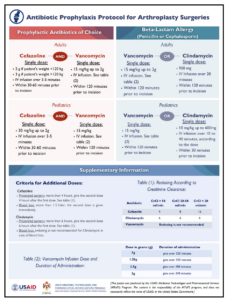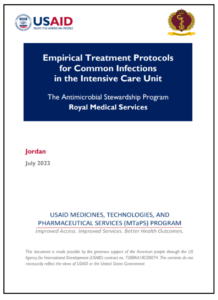Driving Effective Antibiotic Use Across Health Sectors
According to the World Health Organization (WHO), antimicrobial resistance (AMR) kills about 700,000 people worldwide annually, with the majority of those deaths occurring in developing countries. To address this health crisis, Jordan’s Ministry of Health (MOH) is implementing a National Action Plan (NAP) to combat AMR. A significant counterpart in this endeavor is the US Agency for International Development (USAID) Medicines, Technologies, and Pharmaceutical Services (MTaPS) Program, aligned with its Objective 4: Enhancing pharmaceutical services, product availability, and patient-centered care to achieve optimal health outcomes. MTaPS strategically crafted an Antimicrobial Stewardship Program (ASP) tailored for healthcare facilities, aiming to support both the MOH and the Royal Medical Services (RMS), pivotal healthcare providers in Jordan, in executing the AMR-focused NAP.
Within this program, collaborative efforts between clinical and administrative teams at MOH and RMS hospitals have resulted in the development and dissemination of pivotal protocols. These protocols signify a significant stride in updating and standardizing the use of antimicrobials, particularly in treating critically ill patients within intensive care units (ICUs) and offering prophylaxis in select priority clinical areas, including urinary tract infections (UTIs). Building upon the accomplishments of the previous year, these stakeholders are now primed to implement and institutionalize these antibiotic protocols. This concerted effort signals a transformative era, marked by patient-centric care and optimized health outcomes.
Antimicrobial Stewardship at MOH Hospitals: Surgical Prophylaxis and UTI Treatment
Under the guidance of the assigned MOH counterparts, MTaPS supported antimicrobial stewardship (AMS) committees from Mafraq Hospital and Salt Hospital in developing and finalizing four antibiotic prophylaxis protocols for select surgical procedures and one antibiotic treatment protocol for UTI. The protocols were then reviewed by the MOH Central Pharmaceutical and Therapeutics Committee before being submitted to and approved by the Minister of Health, who then disseminated them to all 31 MOH hospitals for implementation.
MTaPS played a pivotal role in not just protocol development but also in ensuring their effective integration. Technical support extended to the MOH Institutional Development and Quality Control Directorate (IDQCD) and the Pharmacy and Clinical Pharmacy Directorate (PCPD) facilitated the creation of essential protocol implementation audit tools and key performance indicators (KPIs). Moreover, the collaborative effort resulted in the establishment of an institutional policy, jointly sanctioned by IDQCD and PCPD. This policy serves as a guiding compass, steering the rational use of antimicrobials (RUA) protocols consistently across all MOH hospitals. The impact of these concerted efforts transcends the mere introduction of protocols. They symbolize a paradigm shift, nurturing a culture of continuous improvement and adaptability within healthcare facilities. By disseminating invaluable lessons and best practices, this initiative sets a new standard in antibiotic stewardship nationwide.

Figure 1: The MOH “Surgical propylaxis protocol for Arthroplasty surguries”. Screenshot : MTaPS Jordan.
Antimicrobial Stewardship at RMS: Managing ICU Common Infections
Based on a request from the RMS to USAID Jordan, MTaPS added AMR activities for the intensive care unit (ICU) of Al-Hussein Hospital in Amman—the largest RMS tertiary center in the country. In collaboration with the hospital leadership, MTaPS activated the central AMR committee, updated its terms of reference, and initiated the RMS AMS program. Through a collaborative approach, the AMR committee developed 27 empirical treatment protocols addressing priority infections in the ICU. With MTaPS’ support, the committee also made necessary updates to existing RMS microbiology lab policies. These measures were taken in response to the heightened risks posed by drug-resistant infections in critically ill patients, aiming to strengthen the hospital’s approach to AMR containment and enhance patient care in the ICU.
In collaboration with the quality department at Al-Hussein Hospital, MTaPS supported the development of audit tools and KPIs to monitor the implementation of the 27 ICU protocols, further institutionalizing protocol implementation and sustaining continuous quality improvement. The intervention in RMS hospitals not only elevates patient care in critical settings but also paves the way for disseminating best practices throughout the healthcare system. This initiative promises widespread impact, combating antimicrobial resistance and promoting sustainable healthcare practices countrywide.
MTaPS collaboration with the MOH and the RMS underscores a paradigm shift in pharmaceutical services. Through knowledge dissemination, stakeholder engagement, and rigorous monitoring, a sustainable framework for antibiotic stewardship has taken root, promising enduring enhancements in patient care.

Figure 2: The RMS “27 Empirical Treatment Protocols for Common Infections in the ICU Cover Page”. Screenshot : MTaPS Jordan.